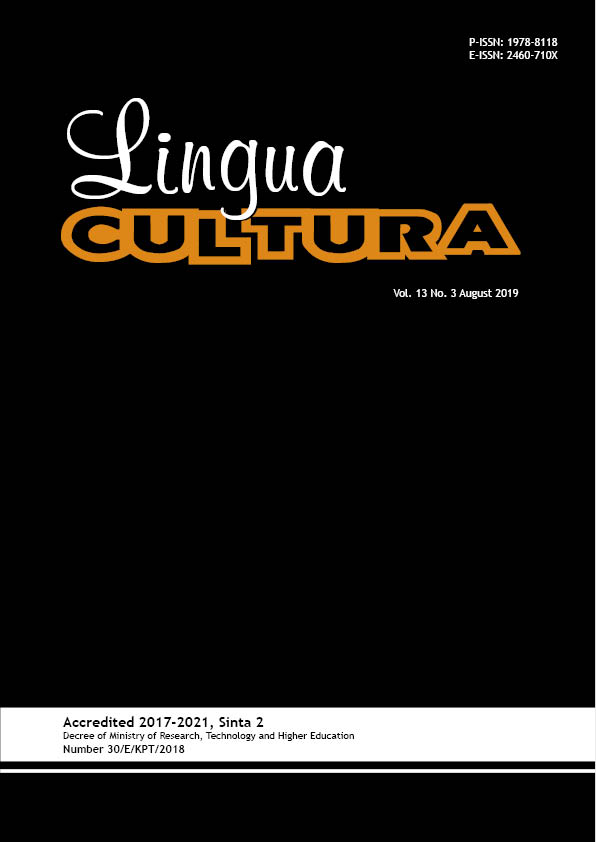Translating Proverbs in the Mate ras Mate Film Texts from Karonese Language into English
DOI:
https://doi.org/10.21512/lc.v13i3.5620Keywords:
English, equivalent, Karonese, proverbs, translationAbstract
The research aimed to explore the problems and the solutions in translating proverbs in the SL into the TL. This research applied a qualitative research and supported by cultural and translation analyses. The data were collected from the dialogues of Ngapul and Yerti in the film of “Mate ras Mateâ€. The Karonese proverbs in the MRM film texts were the source language (SL). The researchers translated the SL and found out their equivalents in the target language (TL) in English. The data for this research were gathered from its film text. After collecting the proverbs in film, the researchers identified and translated them into English. The researchers applied the translation procedures of cultural equivalent, paraphrase, descriptive equivalent, and literal translation method to translate the proverbs in the SL into the TL. The result shows that many Karonese proverbs and cultural terms in the SL have no equivalent in the TL.
References
Aloojaha, A., Nababan, M. R., & Djatmika, D. (2018). The impact of translation techniques on shifting meaning of ordering speech act. Lingua Cultura, 12(3), 279–287. https://doi.org/10.21512/lc.v12i3.4301.
Dewi, N. (2018). Transnational translation of Taiwanese and Indonesian traditional stories for global citizenship. International Journal of Humanity Studies (IJHS), 1(2), 237–242.
Hamer, W., Evenddy, S. S., Prabowo, J., Rima, R., & Utomo, D. W. (2017). Involving local wisdom as values to develop English for Tourism Course material: A case of Baduy Tribe in Lebak Banten. Journal of English Language Studies, 2(1), 92-107. https://doi.org/10.30870/jels.v2i1.1597.
Hilman, E. H. (2015). The translation of Indonesian cultural lexicons in the novel â€Samanâ€. Lingua Cultura, 9(1), 67–74. https://doi.org/10.21512/lc.v9i1.763.
House, J. (2015). Translation as communication across languages and cultures. London: Routledge. https://doi.org/10.4324/9781315668956.
Newmark, P. (1988). A textbook of translation. New York and London: Prentice-Hall International.
Putrawan, G. E. (2018). Foreignization and domestication of Indonesian cultural terms in the novel â€Gadis Pantai†translated into English. Lingua Cultura, 12(3), 309-315. doi: 10.21512/lc.v12i3.4233.
Saldanha, G., & O’Brien, S. (2014). Research methodologies in translation studies. New York: Routledge.
Sembiring, M. (2015). Translating Daliken si Telu texts in Karonese society into English. International Journal of Language Studies, 9(3), 131-146.
Sembiring, M., & Panggabean, H. (2018). Translating culture-bound terms in wedding speech texts of Karonese society into English. SKASE Journal of Translation and Interpretation, 11(1), 69-91.
Tilusubaya, B., Nababan, M., Santosa, R. (2018). Translation analysis of circumstances in the Gospel of Matthew Chapter 12 through 14 from English into Indonesian. Lingua Cultura, 12(4), 415-421. doi: 10.21512/lc.v12i4.4608.
Downloads
Published
How to Cite
Issue
Section
License
Authors who publish with this journal agree to the following terms:
a. Authors retain copyright and grant the journal right of first publication with the work simultaneously licensed under a Creative Commons Attribution License - Share Alike that allows others to share the work with an acknowledgment of the work's authorship and initial publication in this journal.
b. Authors are able to enter into separate, additional contractual arrangements for the non-exclusive distribution of the journal's published version of the work (e.g., post it to an institutional repository or publish it in a book), with an acknowledgment of its initial publication in this journal.
c. Authors are permitted and encouraged to post their work online (e.g., in institutional repositories or on their website) prior to and during the submission process, as it can lead to productive exchanges, as well as earlier and greater citation of published work.
USER RIGHTS
All articles published Open Access will be immediately and permanently free for everyone to read and download. We are continuously working with our author communities to select the best choice of license options, currently being defined for this journal as follows: Creative Commons Attribution-Share Alike (CC BY-SA)


















